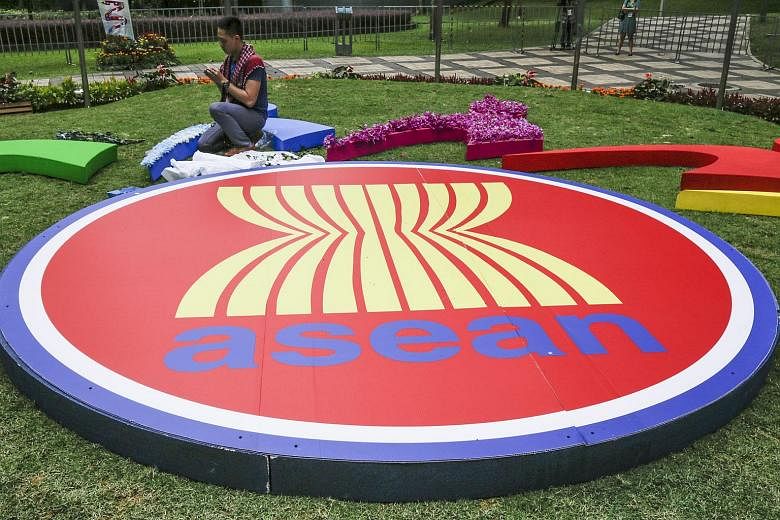KUALA LUMPUR (Reuters) - South-east Asian nations on Sunday (Nov 22) established a formal community that attempts to create freer movement of trade and capital in an area of 625 million people with a combined economic output of US$2.6 trillion (S$3.7 trillion).
The Community declaration was signed by leaders of the 10-member Asean in Kuala Lumpur, this year's host of the group's annual summit.
The Asean Community includes a political, security and socio-cultural dimension in a region with governments ranging from communist in Vietnam and quasi-military in Myanmar to the kingdom of Brunei and the boisterous democracy of the Philippines.
But it is the economic community that offers the most concrete opportunities for integration in a region whose combined gross domestic product (GDP) would make it the world's seventh-largest economy.
"In practice, we have virtually eliminated tariff barriers between us," said Malaysian Prime Minister Najib Razak, the summit host. "Now we have to assure freer movements and removal of barriers that hinder growth and investment."
The countries aim to harmonise economic strategies, recognise each other's professional qualifications, and consult more closely on macroeconomic and financial policies.
They have also agreed to enhance the connectivity of their transportation infrastructure and communications, better facilitate electronic transactions, integrate industries to promote regional sourcing, and enhance private-sector involvement in the economy.
Eight groups of professionals will be able to work more easily throughout the region: engineers, architects, nurses, doctors, dentists, accountants, surveyors and tourism professionals.
Following the signing ceremony, Asean leaders met eight others from Asia and the Pacific for the annual East Asia summit: the United States, China, Japan, South Korea, India, Russia, Australia and New Zealand.
US President Barack Obama was set to raise concerns at the summit about China's more assertive posture in the South China Sea.
On Saturday, at a bilateral meeting with Asean leaders, Mr Obama said countries should stop militarising their claims in the disputed South China Sea. "For the sake of regional stability the claimants should halt reclamation, construction and militarisation of disputed areas," he told a meeting between the United States and the 10 Asean leaders.
China has been transforming reefs in the Spratly archipelago into artificial islands and has built airfields and other facilities on them. This has caused ripples of alarm in much of East Asia about China's intentions and freedom of navigation in a waterway through which US$5 trillion in ship-borne trade passes annually.
China insists it has undisputed sovereignty over most of the South China Sea, a claim that overlaps with four Asean countries.
Earlier this month, US B-52 bombers flew near China's artificial islands, signaling Washington's determination to challenge Beijing over the disputed sea.
China has said it does not want the South China Sea issue to be the focus of the meetings in Kuala Lumpur. Prime Minister Li Keqiang has yet to comment on the issue.
Datuk Seri Najib opened the weekend series of meetings on Saturday, calling on world leaders to confront Islamist extremism.
The night before, Islamist militants killed 19 people in an attack on a hotel in Mali before Malian commandos stormed the building and rescued 170 people, many of them foreigners.
"The perpetrators of these cowardly and barbaric acts do not represent any race, religion or creed, nor should we allow them to claim to do so," Mr Najib said in his speech at the Asean summit. "They are terrorists and should be confronted as such, with the full force of the law."
He said predominantly Islamic countries such as Malaysia have a duty to expose as lies the "ideology propagated by these extremists that is the cause of this sadistic violence".
Mr Obama said on Saturday the Mali hotel attacks only stiffened the resolve of the United States and its allies, which would be relentless in fighting those targeting its citizens and would allow militants no safe haven.
"We will continue to root out terrorist networks," Mr Obama told a meeting of business executives. "We will not allow these killers to have a safe haven."
More stories on the Asean Economic Community (AEC) here.

